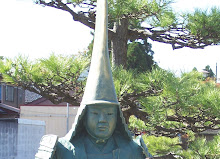It should first be noted that the idea of a meritocracy (the best and brightest get promoted) has not been a big winner in Japanese business culture. The reason is that seniority still determines who runs the show. Now while there is much to be said for the value of experience, there is also the potential that a Japanese Bill Gates is toiling in the mail room when he should be heading the board room.
Here is a reference book at Amazon.com on Japanese business culture: Japanese Business Culture and Practices: A Guide to Twenty-First Century Japanese Business
There's been much written about the Japanese businessmen who don't like to give the American c.e.o. a clear 'yes' or 'no' answer, causing all kinds of cross-cultural problems, but the bigger issue revolves around an old Japanese proverb: "The Nail that Sticks up Gets Shot Down."
The above proverb is the key to understanding both Japanese culture as a whole, and Japanese business culture in particular. There's no question the Japanese are hard working, yet they work within their allotted, approved and institutionally-grounded work spheres. While this has helped the Japanese make excellent cars, it hasn't allowed them to foster the kind of business culture that produced a Microsoft or a Google.
One of worst things a Japanese junior executive can do at a business meeting is to draw attention to himself and his personal opinions. This is a quick way to end up in the dog house.
English teachers in Japan have experienced the same thing: ask a question to Japanese class and even though a few might know the answer, they don't raise their hands for fear of being seen as a show off or for fear of being wrong; mistakes in Japanese culture are not easily forgiven.
While it's difficult to speak in generalities (although I often do this on the blog), the Japanese business culture is about everyone on the team being on the same page, and the proper channels being respected. This characterization, of course, is much like the business culture of other countries, yet the Japanese live with a great fear of being "different" and being on the wrong side of the group consensus.
Because Japan is so homogeneous and Japanese culture is rather uniform in its broad strokes, the Japanese often can "read each other" to such an extent that they often don't need a drawn out discussion to know where the major players stand. This makes it very easy for the group to appreciate that the V.P. of Sales, for example, wants to ink the deal with the American distributor now. And despite misgivings that the junior sales people might feel, they downplay them because they understand - almost without any discussion - that this is the decision that must be made.
Before signing that same distribution deal, a group of American salesmen will have to hash things out together, and there may be individuals who are "on record" for opposing the deal. The V.P. will note the opposition, appreciate the frankness of his staff, yet decide that the deal will go forward. There was no real consensus, but the American V.P. made an executive decision and there's no hard feelings.
This is not how things normally go down in Japanese business culture; before a meeting takes place, it's likely that the participants know the outcome before any "discussion" takes place.
If you lived on one of four small islands in very crowded cities like the Japanese do, accommodation and "harmony" might begin to look far more attractive than self assertiveness and independence.








No comments:
Post a Comment